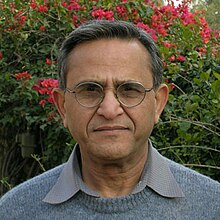Abdul Hameed Nayyar (Born 1945), also known as A.H. Nayyar, is a Pakistani physicist, author, and a freelance consultant on the issues of education, nuclear safety, and energy.[1] His field of specialization is in the physics of condensed matter, and served in the faculties of the Quaid-e-Azam University in Islamabad from 1973 till 2005 and the Lahore University of Management Sciences.[1] Nayyar is known for voicing for education reforms and military arms control, which he directed research programs at the Sustainable Development Policy Institute in Islamabad.[2]
Biography
Nayyar was born in Hyderabad, British India, in 1945, to a Punjabi Muslim Khatri family. His family moved to Pakistan after Partition of India 1947.[3] He was educated in Karachi, and attended the Karachi University where he graduated with BSc in Physics in 1964, and MSc in Physics from Karachi University in 1966.[2]: 269 [4]
Nayyar went to United Kingdom for his doctoral studies, attending the Imperial College in London where he obtained his PhD in condensed matter physics in 1973.[2] His thesis covered studies on magnetic properties of the excited electrons.[3] Upon returning to Pakistan, he joined the Institute of Theoretical Physics (now department of physics) of the Quaid-i-Azam University (QaU) and served on the faculty until 2005.[2]
After leaving QaU in 2005, Nayyar became involved with the public policy issues regarding the education, renewable and fuel cell energy at the Sustainable Development Policy Institute (SDPI) in Islamabad.[5] Since 1998, Nayyar has been a visiting research scholar at the Princeton University in the United States, and has been on the faculty to instruct courses on physics at the Lahore University of Management Sciences in Pakistan.[5]
Political advocacy
Education, peace, and energy
Dr. Nayyar co-edited the SDPI report "The Subtle Subversion: The State of Curricula and Textbooks in Pakistan",[6][7] published in 2003, the report critically examined curriculum guidelines and textbook contents in the mainstream public school system of Pakistan. The report, which was intensely debated on public forums, eventually led to the government exercise to revise school curricula and textbooks (see: Pakistan Studies curriculum).[8] Also from SDPI, he co-authored a critical appraisal of the National Education Policy, published in 2006. He has also researched and written on Madrassa education. For over a year, he served as the Executive Director of Developments in Literacy, an organisation of Pakistani Americans for philanthropic intervention in education to disadvantaged communities in Pakistan. Also for a year in 2010, he served as the Director of the Ali Institute of Education, Lahore. He has since authored a number of articles further criticising the state of education in Pakistan.[9][10]
Peace activism
Dr. Nayyar also takes an active interest in the national and international peace movements. Dr. Nayyar is a member of the Global Council of Abolition 2000.
Anti-nuclear movement
Another area that interests him is nuclear disarmament. He holds a visiting position at the Program on Science and Global Security of the Woodrow Wilson School at Princeton University, US, where he spends summer months conducting technical studies on issues in nuclear disarmament. He is a member of the International Panel on Fissile Materials.
Renewable energy
In the area of renewable energy, the energy group at SDPI that he helped establish, has studied the question of marketability of renewable energy technologies with a view to identifying policy measures that could promote their use in Pakistan.
